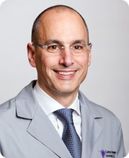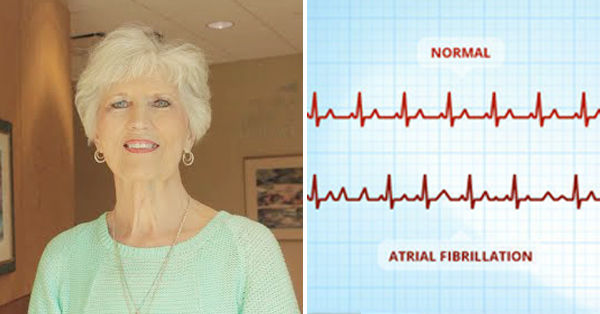Linda “Gets Her Life Back” After Mitral Valve & Maze Procedure
By Adam Pick on March 16, 2015
The highlight of my day is meeting and spending time with patients. I love hearing their stories. I love getting to know them. I often find myself in awe and then tears after listening to their inspirational stories.
That said… I recently connected with Linda Staples during my travels to Indianapolis. Linda, who was diagnosed with atrial fibrillation and mitral valve disease, really touched and moved me. To share Linda’s story with you, we filmed this video together.
I can’t thank Linda enough for sharing her story with me. And, I’m very happy to report that Linda is now preparing to play golf this summer.
Also… A very special thanks goes out to Dr. Marc Gerdsich, Vanessa Vitsas, Nicole Reitz, Tara Lopez and the entire team at Franciscan St. Francis for helping Linda get her life back.
- Learn more at the new Atrial Fibrillation Education Center.
- See the Interactive Surgeon Profile of Dr. Gerdisch.
Keep on tickin’ Linda!
Adam
P.S. To help the hearing impaired members of our community, please find below a written transcript of this video.
Linda Staples: My name is Linda Staples and I’m from Columbus, Indiana. I’m married and I have three children, eight grandchildren and one great grandchild. I’ve had AFib for a long, long time, many years. I would be lightheaded and dizzy. I slept all the time. I would get out of bed after sleeping eight hours and go to the couch and sleep. I thought I was going to die.
Dr. Marc Gerdisch: My name’s Marc Gerdisch. I practice at Franciscan St. Francis Heart Center in Indianapolis, where I’m the Chief of Cardiovascular and Thoracic Surgery. I’ve been in practice for a little over 20 years. Valve pathology generally is a mechanical problem, and fixing that mechanical problem makes people better. That was what attracted me the most really, was something that we could actually fully impact and fully reverse.

Atrial fibrillation is commonly referred to as an irregular heart rhythm, and it is common in fact to most people. They either know someone who’s had it or they may even have had it themselves. The most common type of heart disease, with which atrial fibrillation is associated, is valve disease. The typical causes of atrial fibrillation which include hypertension and sleep apnea, obesity and diabetes, all of those things seem to be related to atrial fibrillation. Patients with heart disease, especially valve disease, also have additional stress on the upper chambers of the heart. The changes in the characteristics of the muscle itself then lends itself to atrial fibrillation
Linda Staples: There wasn’t a good quality of life before surgery. Nobody knows what kind of life that it. It’s like not having a life.
Dr. Marc Gerdisch: This irregular heart rhythm, atrial fibrillation, is chaotic electrical activity in the upper chambers of the heart. Instead of the usual synchronized movement of the upper chambers of the heart, where the upper chambers contribute to the cardiac output, where they contribute to the blood flow through the heart, instead of that, the upper chambers are just doing this. They’re just kind of shivering. People often say it looks like a bag of worms when you look at the surface of the atrial.
Now some people won’t really notice it right away. Sometimes it’s a more quiet process where they think I’m just getting a little older, maybe I’ve put a couple of pounds on and so I feel little less strong or easily fatigued, or even short of breath. In other people when they go into atrial fibrillation, it’s a sudden change for them. With that, they lose some of their cardiac output and they become short of breath. They become weak. They become easily fatigued.
Linda Staples: I didn’t know I had valve problems until I came up here.
Dr. Marc Gerdisch: Linda’s an interesting case. She had been in atrial fibrillation for quite a long time. Her heart rate had been elevated and her left ventricle, the chamber of her heart, had become extremely weak. It was only squeezing about a third of normal, actually less than a third of normal. Now the heart muscle’s weak, the heart’s enlarged, the valves are leaking, and the patient has long-standing persistent atrial fibrillation, with very large atria.
That’s a difficult scenario to treat effectively because we have to be perfect with everything. The valves have to be perfect. The Maze operation has to be perfect. It has to be perfectly executed. This is such a ubiquitous conditions; it’s found at so many levels throughout cardiovascular medicine. As we become more educated, as we recognize the things that are going to promote atrial fibrillation or decrease its incidence, from our end, from the heart surgeon end, we’re going to see an increase in the treatment of atrial fibrillation, where people are having heart surgery because right now, we’re not doing a great job with it.
Linda Staples: One of the doctors said that they could nothing for me, except a heart transplant. I still had faith, and Dr. Gerdisch came in and said, “I’m going to try to save your life,” and he did.
Dr. Marc Gerdisch: Linda did wonderfully. Linda, after her surgery — and Linda has a great mental attitude as well. She was up for the game in the beginning and came out of it wonderfully. She’s gone on to be very active after her surgery and her muscle recovered. When we reversed that arrhythmia, eliminate the high rate, fix the valves so the valves aren’t leaking and the heart’s no longer volume overloaded, then we do see often, as was the case for Linda, we see that muscle recover.
Linda Staples: After surgery, my life is more fulfilling. I can do just about anything I want to do. I have a better quality of life. It’s normal! It’s absolutely normal. This summer, I like working on the yard. I have flowers, and I can do that this year. When I came up here, I didn’t think I’d ever see my home again. If I can help one person go through what I’ve already been through, everything I went through is worth it.
Dr. Marc Gerdisch: I really believe that if a patient has valve disease and atrial fibrillation, they should be seeking out full information about the disorder, the atrial fibrillation. They should be well educated about the opportunity to eliminate it. When a patient has both atrial fibrillation and valve disease, I think it’s crucial that they become well educated about the disorder, about both disorders. They understand what the opportunities are to eliminate the atrial fibrillation, when their valve disease is being addressed.
Linda Staples: If I were to give advice to a patient needing heart surgery, I would say come and see Dr. Gerdisch, No. 1. No. 2, don’t put it off. If you start having problems with your heart, go see a specialist. Go see somebody that knows what to do.

|
Fran Zilko says on April 1st, 2015 at 3:44 pm |
|
I have long standing a-fib, which was not able to be reversed by a maze procedure. Did have a mitral valve bovine valve and a tricuspid repair at the Cleveland Clinic by Dr. Gillinov. My a-fib is mostly controlled by medication and I am doing well. Also had three cardio-versions that were not successful. So, am on coumadin forever and dealing with it and happy to be alive. |
 |
|
Adam says on April 1st, 2015 at 3:55 pm |
|
Hey there Fran!!!! Your attitude, given all that you have been through, continues to inspire me and all those around. I see you had another reunion in Florida. So happy to see that your friendships through our community continue. Such a great thing you, Cheryl, Duane are doing. Adam |
 |
|
Iryna Martinez says on April 1st, 2015 at 9:19 pm |
|
Hi Fran. My mum had mitral and trucuspid valve repairs and Maze procedure. Dr Patrick McCarthy and his team saved my so beloved mother’s life. My mum had 32 years afib, pace maker and two valves were leaking. She came out of surgery with afib but it is controlled by medication and she is feeling better and better. Thank you for sharing. Now I know that we are not alone. |
 |
|
Linda Hughes-Afflerback says on April 2nd, 2015 at 1:05 pm |
|
i ave identical symptoms. it’s nice to know i’m not alone and it’s not all in my head. Thanks for giving me hope.! |
 |
|
Adam says on April 2nd, 2015 at 2:54 pm |
|
Linda, You are not alone. And, it’s not all in your head. To learn about AFib, its symptoms and more, please visit our new AFib & Valve Educational Center. There, you will find several patient success stories. The link is http://www.heart-valve-surgery.com/atrial-fibrillation/. |
 |
|
Fran Zilko says on April 2nd, 2015 at 3:50 pm |
|
Hi Adam, thanks for your kind comments. Our annual reunion also includes Richard Inghams (Maine). We all look forward to our February reunions in FL. Enjoyed the softball photos of your son, times flies by. |
 |
|
Mike Culpepper says on April 3rd, 2015 at 2:24 am |
|
Thank you , Linda and thank you, Adam! My experience was very similar, except the AFib came on rather rapidly. As a moderate runner, I suddenly noticed one day that it seemed there was no oxygen in the air. After that, I gradually lost out on distance endurance (I am 64). I went to a cardiologist about 6 weeks later. When he began my echo-cardiogram, he asked if I knew I was in AFib! I also had moderate to severe Mitral valve prolapse. |
 |
|
Angie Gregory says on January 10th, 2016 at 6:29 am |
|
Hi Linda! Your story is inspiring. Dr. Gerdisch also did my mitral valve surgery – giving me my life back as well. I know exactly what you mean. Brings back memories from 4 years ago. So happy you feel well! |
 |












